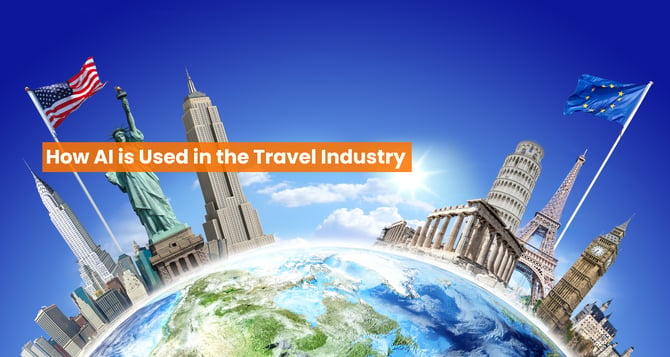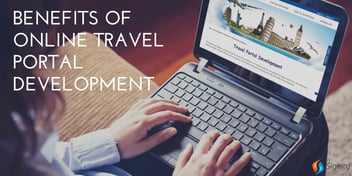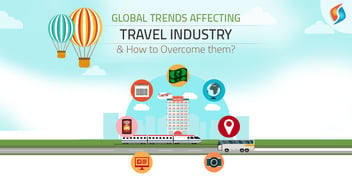12 Ways How AI is Used in the Travel Industry
AI is changing the travel sector by making it more personalized, efficient, and profitable. Travel businesses that use AI tools like chatbots, booking assistants, and predictive analytics have a competitive advantage and happier customers.

Airlines, hotels, and travel agencies are increasingly using AI to meet changing customer preferences and needs. One popular example of using AI in travel is Qatar Airways. It has introduced AI flight attendants that combine technology with a human touch to improve customer service.
In fact, even numbers suggest so! According to GrandViewResearch, the global AI in tourism market is expected to grow from USD 3.37 billion in 2024 to USD 13.87 billion by 2030, at a CAGR of 26.7%. Even 40% of global travelers have already used AI-based tools to plan their trips, and 62% are open to using them in the future.

This growing adoption reflects a clear demand for personalized customer experiences, driven by intelligent systems that understand and anticipate individual preferences.
As a leader in the travel industry, using AI alone is not enough. It also includes identifying the high-impact use cases and adopting them with the strategized thinking. In this blog, we will explore AI use cases in travel, how you can use these innovations to grow your business and improve customer satisfaction.
 Generate
Key Takeaways
Generating...
Generate
Key Takeaways
Generating...

-
AI helps create personalized travel experiences that make customers happier and more engaged.
-
Using intelligent AI tools makes it easier to manage bookings, prices, and baggage handling. This helps reduce costs and mistakes.
-
AI analyzes travel patterns, preferences, and market trends to help businesses make better decisions.
-
Using dynamic pricing, targeted offers, and predictive analytics can bring revenue growth for businesses while also increasing bookings.
-
AI helps businesses set better prices, run operations more efficiently, and serve customers more effectively. This results in cost savings and higher profits for business leaders.
-
The future of AI in travel and tourism focuses on hyper-personalization. AI-driven concierges, predictive analytics, and sustainable travel solutions will change the industry.
How is AI Useful in the Travel Industry?
AI is changing the travel industry by acting as a personal travel assistant. It includes chatbots that create dream itineraries and AI assistants that find the best deals and help with navigation. AI customizes your travel plans based on user preferences and provides real-time support, opening up many possibilities for your trips.
For example, platforms like Booking.com use AI and machine learning to offer personalized travel suggestions. AI also helps promote sustainable travel by guiding travelers and companies to make eco-friendly choices. And this doesn't end here. There is a lot more to it. Let us explore some AI use cases in the travel and tourism industry and how it create an impact.
Top brands like Qatar Airways and Expedia already use AI, why not you!
Gain the same competitive edge with a trusted AI development partner to enhance traveler experiences and enhance productivity.
AI Use Cases in the Travel Industry
Artificial intelligence in tourism and travel uses data to make informed decisions. It helps with booking, provides chat support anytime, predicts prices, and offers real-time information. This allows travel companies to create personalized experiences, improve their operations, and increase their profits.
1. AI Chatbots and Online Customer Service
AI powered chatbots are changing how travel companies interact with customers. They provide quick help for booking questions, flight updates, and support after trips, available 24/7. This reduces wait times and cuts costs. In fact, 80% of customer interactions in travel are now handled by these chatbots.
Top brands are already leading the way. KLM’s BlueBot helps travelers book flights and check updates quickly. Marriott’s AI chatbot manages reservations and guest requests by providing personalized answers. These smart assistants improve customer satisfaction and allow human agents to handle more complex issues.

2. Sentiment Analysis
In the travel industry, managing finances can be made easier with the help of AI. It helps automate routine tasks like generating reports and managing invoices for finance teams. By integrating AI-powered tools like Account Reconciliation Software, travel agents can check financial data in real-time and identify any unusual activity. This saves time and resources.
3. AI Travel Agents for Quick Travel Bookings
Companies are increasingly using AI agents for travel bookings. And certainly, AI travel agents are handling it all well. These travel assistants streamline the booking process by offering instant, personalized, and intelligent assistance that was once possible only through human agents. Using natural language processing and real-time data, these AI agents understand traveler preferences, compare options, and make tailored recommendations, all within seconds.

One prime example is Expedia Group’s AI-powered trip planner. It uses generative AI to help users create customized itineraries and make trip planning based on prompts like “plan a family trip to Italy.” And the impact is certainly real. According to market.us, using AI for customer segmentation can increase travel agency conversion rates by as much as 30%.
4. Dynamic Pricing
Pricing in the travel industry fluctuates constantly. This is where AI is making a huge difference. With AI-driven dynamic pricing, travel companies can change flight prices, hotels, and tour packages automatically and in real-time. They can adjust prices based on factors like demand, season, competitor rates, and booking patterns.
For instance, Airbnb uses AI tools that look at over 70 different factors to set prices. And its impact is real. According to McKinsey, companies that use AI in travel for pricing have seen their revenue increase significantly. Some companies report gains of up to 10%.
5. AI for Fraud Detection in the Travel
Fraud quietly reduces profits in the travel and tourism industry. As digital transactions rise, so do fraud attempts. Fraud rates in travel are three times higher than in retail, costing the sector $25 billion annually.
This is where AI-driven fraud detection helps. Unlike traditional methods, AI models work in real time by analyzing thousands of booking patterns, user behaviors, and payment details to identify suspicious activity instantly.
For instance, Airbnb uses AI algorithms to detect fake listings, suspicious logins, and unusual booking behaviors. These systems learn from past customer data, continuously improving their accuracy and drastically reducing false positives that frustrate legitimate customers.
6. Intelligent Baggage Handling Systems
Intelligent baggage handling systems use AI and IoT technology to track luggage during travel. In fact, airports also use AI systems to automate sorting and routing, which helps minimize lost or delayed baggage. Real-time monitoring using artificial intelligence helps ensure that bags arrive on time, minimizes lost luggage, and enhances operational efficiency. This technology makes traveling easier for passengers and reduces the chances of mishandling luggage.
7. Data Analysis for Travel Using AI
Travel companies collect a lot of data every day, but this raw data alone isn't enough. They need to make better decisions using clean data. AI-powered data analysis helps turn this chaos into clear insights.
With AI, travel firms can quickly identify patterns that appeal to leisure travelers :
-
What customers truly value
-
Which routes are underperforming
-
Where costs escalate
-
How seasonality impacts demand.
Using AI helps travel companies set better price trends, use their resources more effectively, reduce missed chances, and make customers happier. About 72% of travel companies use AI to analyze data and improve their marketing strategies.
Air France-KLM recently teamed up with Google Cloud to use generative AI for analyzing data. They now look at passenger preferences, travel patterns, and predict when aircraft need maintenance using generative AI tools. Tasks that used to take hours for maintenance analysis are now completed in minutes.
Turn travel insights into profits with AI
From dynamic pricing to predictive analytics, AI can help your business maximize revenue while reducing costs.
8. Facial Recognition for Changing Travel Experiences
Facial recognition technology is improving travel experiences by enhancing security and streamlining operations. The system uses artificial neural networks to process biometric data. It generates filters that change details from a facial image into numbers. Then, it compares these numbers with a database to find similarities.
Many airports globally are using facial recognition technology to make check-ins and document verification faster for travelers. Airlines like JetBlue have already started using self-boarding gates that scan faces. This allows passengers to board flights without needing traditional boarding passes. According to the IATA Global Passenger Survey, 75% of passengers are comfortable with sharing their biometric data before traveling. Additionally, over 70% of airlines plan to use biometric ID management by 2026.
9. Flight Forecasting
Flight forecasting is an important use of AI that is changing the travel industry. AI analyzes large amounts of data, such as past flight patterns, weather, and air traffic, to predict flight delays, find better routes, and improve overall efficiency. For example, British Airways invested £7 billion in AI, which has significantly improved its on-time flight performance. In the first quarter of 2025, 86% of flights left on time.
These advancements make operations smoother and help improve customer satisfaction. They reduce delays and provide more accurate travel information.
10. Language Translation with AI
Effective communication is crucial in the global travel industry. AI language translation tools are changing how businesses connect with international customers. These tools help create smooth experiences and widen market reach.
For example, Qatar Airways has launched Sama 2.0, an AI-powered flight attendant. It helps passengers in multiple languages through interactive kiosks and mobile devices, as well as the Qatar Airways app. This technology improves customer service by offering real-time, multilingual support, making travel easier and more personalized.

The growth of AI translation is clear in the market numbers. The global AI language translator tool market is expected to reach USD 248.39 million by 2032, growing at a compound annual growth rate (CAGR) of 8.5%. This growth underscores the growing demand for multilingual communication in the travel industry.
11. Personalized Travel Experiences Tailored to Individual Preferences
AI is providing personalized travel experiences that match individual preferences. By using AI to analyze traveler data, businesses can give specific recommendations. This increases customer satisfaction and helps boost sales. AI can analyze market trends, evaluate large amounts of data, behaviors, and preferences of different types of travelers. It can also keep track of each traveler’s history.
With this information, a person can use AI to plan a trip that includes the best travel options based on their preferences. AI can recommend cities with fewer tourists that offer unique experiences suited to the traveler’s interests. This level of personalization ensures that each person gets exactly what they want, making their trip more enjoyable and hassle-free.
Lead the travel market with AI
Use data, automation, and personalization to grow faster and make smarter decisions.
12. AI for Booking Assistance in Travel
AI booking assistants are making the booking process easier and more personalized. These smart systems analyze a vast amount of data to suggest flights, hotel reservations, and activities that match the preferences of individual travelers, thereby simplifying the planning experience. For example, companies like MakeMyTrip have created multilingual AI-based trip planning assistants that help users from discovering destinations to supporting them after their trip. This helps in improving user engagement and satisfaction.
Benefits of AI for Travel Companies
Artificial intelligence brings a myriad of benefits to the travel businesses. From enhancing operational efficiency to delivering personalized experiences, AI adoption in the travel industry is taking the travel experience to the next level. Here are some of the ways AI benefits businesses:
Improved Customer Experience
Enhance customer engagement by creating personalized itineraries and providing real-time assistance with an AI chatbot.
Innovative Services
Using smart technology businesses can improve their customer service. This will help build customer loyalty through innovative solutions.
Sustainable Travel
Businesses can match the growing demand for eco-friendly trip planners that use AI and offer customers sustainable travel options.
Brand Strengthening
Using AI technology, businesses can improve their brand's position by making processes more efficient in various areas.
Enhanced Safety and Security
In the travel industry, facial recognition systems speed up check-ins at airports and hotels. It also improves security by quickly verifying identities. These AI systems also monitor for unusual behavior, alerting security if someone attempts to enter restricted areas or exhibits suspicious behavior.
How Business Leaders Can Leverage AI in Travel?
For business leaders, adopting AI begins with a clear and practical approach. Here is how businesses in the travel industry can leverage AI's complete potential.
Identify High-Impact Use Cases
Focus on areas where AI can create the most value. This includes personalized recommendations, dynamic pricing, operational efficiency, and customer support. Emphasize the projects that directly boost revenue or enhance traveler experience.
Partner with AI Experts
Collaborate with Hospitality AI Consulting and Development Company or technology experts who know the travel industry. Their knowledge helps you use AI faster, lower risks, and make sure the technology meets your business goals.
Start Small with Pilot Projects
Test AI solutions on a small scale before using them fully. Small projects can help you measure results, improve your strategies, and build confidence in your team without causing major disruptions.
Focus on Data Quality and Integration
AI works best with good data. Ensure your systems collect accurate and relevant data, and connect it across various platforms. When data is well-managed, it helps improve predictions, personalization, and decision-making.
Real-World Examples of AI in the Travel Industry
AI in the travel industry is not a new concept. Even popular brands are leveraging it to enhance their business operations. Below are some of the popular AI examples in the travel industry that are using artificial intelligence to improve their offerings.
Rocket Travel
Rocket Travel by Agoda helps brands provide their customers with travel loyalty experiences. The company creates travel websites that build customer loyalty through personalized offers on hotel stays, car rentals, flights, and activities. They use Gen AI for tasks like translating room titles and for other improvements in their white-label solutions.
Hyatt
Hyatt is an international hotel chain that is improving its services by using AI technology and machine learning algorithms. They have introduced an AI-powered bed called the Bryte Restorative Sleep bed. This bed has sensors that monitor a person's heart rate and breathing. It can change its temperature and firmness to help people sleep better. Customers can also set programmed movements, so the bed can gently wake them up in the morning.
Trip Advisor
Tripadvisor has launched a travel planning app that uses AI technology to create personalized itineraries. To make an itinerary, travelers need to enter their destination, travel dates, who they are traveling with, and what activities they like. Within seconds, they receive a customized day-by-day itinerary that they can save, edit, and share with their travel companions.
Future of AI Tools in the Travel Industry
The travel industry is about to change significantly. And the new advancements in AI technology make business leaders need to understand these changes to stay competitive and meet customer needs. Here are some of the travel trends with AI and advanced technologies that businesses can expect in the near future.
1. Agentic AI and Autonomous Systems for Travel Management
Agentic AI represents a significant advancement over traditional AI. Agentic AI can make independent decisions and take actions on its own. In the travel industry, this allows it to adapt to new data, change travel plans, set better prices, and manage bookings without human assistance.
2. AI-Driven Metaverse Travel Experiences
The metaverse is changing travel by offering virtual environments where users can explore destinations, interact with virtual guides, and engage in immersive activities. This allows travelers to make informed decisions before their real trips. AI creates realistic simulations of these destinations, enabling people to experience them from home and make easier choices about where to go.
3. AI Avatars for Personalized Recommendations
AI avatars can provide personalized help, answer questions, and give recommendations. This makes the travel experience more interactive and enjoyable.
4. Hyper-Personalization Using Real-Time Data
AI helps create personalized travel experiences by studying data such as browsing habits, travel history, and social media activity. Many travelers now expect these tailored experiences. AI can provide customized itineraries, personalized offers, and relevant content to meet these expectations.
Conclusion
Artificial intelligence in the travel and tourism sector enhances personalization, efficiency, and profitability within the industry. For businesses, introducing AI tools like intelligent booking assistants, predictive pricing, and AI chatbots is gaining an edge over their competitors. For business leaders, adopting AI helps them offer customized experiences to travelers and enhance operations without increasing costs. Collaborating with an AI development company can help implement these solutions smoothly. They can help transform insights into practical strategies that drive growth.
Frequently Asked Questions
Have a question in mind? We are here to answer. If you don’t see your question here, drop us a line at our contact page.
How is AI personalizing the travel experience?
![]()
AI personalizes travel by analyzing data to provide customized recommendations for destinations, activities, and accommodations. It also offers tailored programs and timely updates, enhancing your overall experience.
How can AI improve travel customer experience?
![]()
AI enhances customer service through virtual assistants and chatbots that provide 24/7 support for bookings and inquiries. They automate routine tasks related to revenue management and offer assistance in multiple languages, resulting in quicker responses and increased customer satisfaction.
What are the benefits of artificial intelligence in travel?
![]()
AI in travel streamlines processes by offering personalized recommendations, enhancing customer service, reducing costs, and assisting with maintenance. This results in a smoother and more enjoyable travel experience.


%201-1.webp?width=148&height=74&name=our%20work%20(2)%201-1.webp)


.png?width=344&height=101&name=Mask%20group%20(5).png)

















